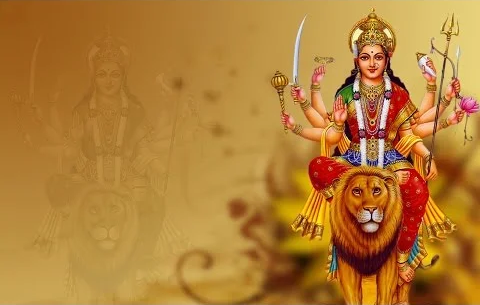
Saptashloki Durga – A simple presentation
By: Rajender Kapil
Saptashloki Durga is a concise form of our revered text, Durga Saptashati, which contains seven hundred verses dedicated to the praise of Goddess Durga. These seven verses are a distilled version of the Durga Saptashati, compiled to provide spiritual strength to devotees and protection from hardships. It is a brief version of the Devi Mahatmya, found in the Markandeya Purana. By reciting or chanting these verses, devotees receive the blessings of Mother Durga, and their pain and troubles are alleviated. Below is a humble attempt to provide a simple interpretation of these verses.
In response to Lord Shiva’s inquiry, Goddess Durga promises to guide him and all devotees in the Kali Yuga to fulfill all desires. In this context, the beginning of the Durga Saptashati begins with the dialogue between Shiva and Parvati, in the form of Saptashloki Durga. Let us explore this deeper.
First Verse:
Om Jnaninamapi Chetamsi Devi Bhagwati Hi Sa,
Baladakrshya Mohaya Mahamaya Prayacchati.
- Om: The primordial sound, associated with the origin of the universe, and a sacred symbol.
- Jnaninamapi Chetamsi: The power of Goddess Mahamaya is so profound that she captivates even the minds of wise people.
- Devi Bhagwati Hisa: Goddess Bhagwati, who embodies the power (Hinsa) which represents Durga’s essence.
- Baladakrshya Mohaya: She attracts and mesmerizes everyone by her divine power.
- Mahamaya Prayacchati: Through her divine illusion (Maya), she brings everything under her control.
In this verse, Goddess Durga is presented as Mahamaya, whose power is so immense that even the wise are enchanted by her. It reflects her extraordinary power and influence.
Second Verse:
Durge Smrita Harasi Bhitimasheshajantho,
Svasthai Smrita Matimativa Shubham Dadasi,
Daridryaduhkabhayaharini Ka Tvadanya,
Sarvopakarakaranaaya Sadarsha Citta.
- Durge Smrita Harasi Bhitimasheshajantho: O Durga, when you are remembered, you remove the boundless fear of all living beings.
- Svasthai Smrita Matimativa Shubham Dadasi: When remembered with a pure heart, you grant extremely auspicious wisdom.
- Daridryaduhkabhayaharini Ka Tvadanya: You are the one who removes poverty, sorrow, and fear; no one else is like you.
- Sarvopakarakaranaaya Sadarsha Citta: You are always ready to help all, with a heart full of compassion.
This verse describes Goddess Durga as a compassionate figure who removes fear, grants wisdom, and eliminates poverty, suffering, and fear. Her benevolence is limitless, always working in the service of her devotees.
Third Verse:
Sarvamangalamangalyye, Shive Sarvarthasadhike,
Sharanye Tryambake Gauri Narayani Namostu Te.
- Sarvamangalamangalyye: You are the source of all auspiciousness and the most beneficial for all.
- Shive: The consort of Shiva, symbolizing peace and prosperity.
- Sarvarthasadhike: You are capable of fulfilling all desires and objectives.
- Sharanye: You are the refuge to seek in times of crisis.
- Tryambake Gauri: Gauri, the consort of Lord Shiva, symbolizing purity and holiness.
- Narayani: The power of Narayan (Vishnu), the preserver of the universe.
- Namostu Te: I bow to you and offer my salutations.
In this verse, devotees praise the Goddess for being the source of all auspiciousness, the embodiment of peace, capable of fulfilling all desires, and a refuge for all in times of distress.
Fourth Verse:
Sharangatadineartaparitrana-parayane,
Sarvasyartihare Devi Narayani Namostu Te.
- Sharangatadineartaparitrana-parayane: You are dedicated to the protection of those who seek refuge and are distressed.
- Sarvasyartihare: You remove all forms of suffering and pain.
- Devi Narayani Namostu Te: O Goddess Narayani, I bow to you.
This verse praises Goddess Durga for her divine qualities of protecting the distressed and alleviating the suffering of those who seek her refuge.
Fifth Verse:
Sarvaswarupe Sarveshe Sarvashaktisamanvite,
Bhayebhyastrahi No Devi Durge Devi Namostu Te.
- Sarvaswarupe: You are present in all forms, meaning Goddess Durga is present in everything.
- Sarveshe: The supreme deity of all, the ruler of all beings.
- Sarvashaktisamanvite: You are endowed with all powers.
- Bhaye Bhyaas Traahi No Devi: O Devi, protect us from all fears.
- Durge Devi Namostu Te: O Durga Devi, I bow to you.
This verse emphasizes the supreme power of Goddess Durga and seeks her protection from all fears and obstacles.
Sixth Verse:
Roganasheshanapahamsi Tushta Rushhta Tu Kamam,
Sakalabheeshtan Twam Ashritanam Na Vipannaranaam,
Twam Ashritaa Hyashrayatam Prayanti.
- Roganasheshanapahamsi Tushta: When you are pleased, you remove all diseases and afflictions.
- Rushhta Tu Kamam Sakalanbheeshtan: When you are angry, all unwanted desires and negative outcomes are destroyed.
- Twam Ashritanam Na Vipannaranaam: Those who seek your refuge are never ruined.
- Twam Ashritaa Hyashrayatam Prayanti: Those who take refuge in you become sources of support for others.
This verse highlights the divine compassion of Goddess Durga, who removes all ailments and negative desires, and protects those who take refuge in her.
Seventh and Final Verse:
Sarvabadhapramshanam Trailokyasyaakhileshwari,
Evamev Twaya Karyamasmadvairi Vinashanam.
- Sarvabadhapramshanam: You remove all obstacles and hindrances.
- Trailokyasyaakhileshwari: You are the queen of the three worlds: heaven, earth, and the underworld.
- Evamev Twaya Karyamasmadvairi Vinashanam: Therefore, it is your duty to destroy our enemies and protect us.
In this final verse, devotees pray for protection from all obstacles and enemies, acknowledging the supreme power and mercy of Goddess Durga.
By reciting the Saptashloki Durga, devotees can attain spiritual strength, security, and success. This prayer invokes the infinite powers of Goddess Durga and paves the way for receiving her blessings, offering protection from physical, mental, and spiritual challenges.